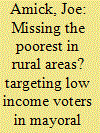| Srl | Item |
| 1 |
ID:
160634


|
|
|
|
|
| Summary/Abstract |
This article utilizes an original household survey of two regency-level elections in Indonesia to explore campaign targeting. It uses a list experiment to show that direct survey questions about accepting transfers from campaigns elicit honest responses from respondents in Indonesia. Although the relationship between income and whether a respondent accepted transfers from political campaigns decreases over the entire distribution of income, it increases initially, producing a curvilinear relationship between income and accepting transfers from campaigns. This article argues that the poorest voters face barriers to being targeted by campaigns. However, these barriers recede as they become relatively richer, at which point a negative relationship is found due to diminishing marginal utility of accepting these transfers. Finally, in-kind transfers, as opposed to cash transfers, target low-income voters more effectively.
|
|
|
|
|
|
|
|
|
|
|
|
|
|
|
|
| 2 |
ID:
186566


|
|
|
|
|
| Summary/Abstract |
Anti-corruption efforts are inherently political. Corruption charges can be levied against political opponents as an instrument of repression; they can also be used against troublesome allies in the same party coalition to further consolidate power. In this paper, we focus on Indonesia and ask: Do major corruption charges follow a presidential electoral cycle—and if so, how? We contend charges against prominent members of the government coalition are more likely to happen before an election, allowing the government to replace intra-party rivals with loyal allies. Conversely, charges against prominent opposition members are more likely to happen after an election when fears of retaliation are low, opportunities for credit-claiming are high, and there is an incentive to remove veto players who may inhibit implementing the government's agenda. To test this argument, we use an original, newly assembled dataset of all major corruption charges—i.e., those involving high-profile politicians and garnering international attention—in Indonesia from 1998–2015 as reported in the Associated Press. We find a significant and robust relationship between the electoral calendar and major corruption charges. This relationship is robust across presidential administrations. These results yield insights into how anti-corruption efforts can become a political tool and counsel caution about the effectiveness of “good governance,” especially in new democracies. Finally, we discuss how contextual political factors external to Indonesia's anti-corruption commission, reinforce this empirical pattern.
|
|
|
|
|
|
|
|
|
|
|
|
|
|
|
|